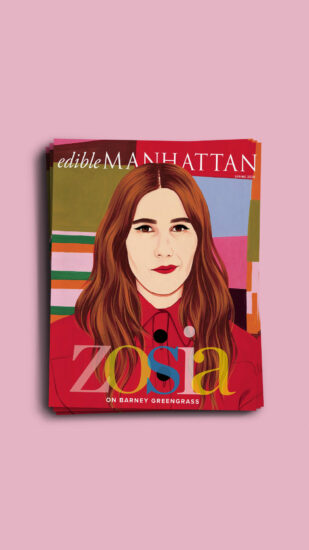
Appropriately, Mt. Sinai Hospital and the Museum of the City of New York flank the New York Academy of Medicine on the Upper East Side. Founded by a group of reform-minded physicians in 1847, the academy is dedicated to improving the health of city-dwellers, and these days it’s mostly focused on healthy aging and eliminating health disparities among vulnerable populations.
But on the third floor something else is going on: It’s home to the academy’s rare book collection, and of the 32,000 titles in the wood-paneled library, nearly 10,000 of them are related to food, cooking and nutrition.
The room itself is a bibliophile’s fantasy. Dim and cool, the walls are lined with built-in bookshelves housed with colorful spines encased in metal grates. There are ladders to reach the higher shelves, and softly lit ceiling lamps feature wrought-iron stamps from old printers, evoking not just the history of the medical, scientific and food books housed here, but the history of printing as well.
The bulk of the rare cookbooks, pamphlets and medicinal recipe books in the academy’s collection were donated in 1929 by Margaret Barclay Wilson, a Scottish-born immigrant and a fellow at the academy who became a doctor in 1893 and taught physiology and hygiene at Hunter College for 40 years. Thanks to Wilson’s zeal for book collecting, the academy has the crown jewel of its collection: a copy of what’s generally agreed to be the oldest cookbook in the West: De re coquinaria (On the Subject of Cooking) by Apicius (more on that soon).

The codex dates back to 900 AD, and the book itself is an extraordinary object: Handwritten on vellum, the pages are thick but light and perfectly intact. The integrity of the red and black calligraphy (as seen in the featured photo at the top of this article) is also impeccably maintained.
Touching a book this old is an easy way to get goosebumps; you’re reminded that things endure with the written word. “The book is our most long-lasting technology, and that’s extremely powerful,” says Anne Garner, the curator of rare books and manuscripts at the library. “When you see how [a book] was used, when you see pages that are dog-eared, when you see residue from someone actually cooking in a 17th-century kitchen—these signs of daily life make history come alive. That’s the power of a primary source.”

In addition to a large collection of menus and pamphlets, the academy also has such rare titles as Opera dell’arte del cucinare by Bartolomeo Scappi (1596), a cookbook that contains what’s believed to be the first illustration of a fork and authored by the first “celebrity chef” (he cooked for three Popes). You can find the first known illustration of a turkey in Ein new Kochbuch by Marx Rumpolt (1581), the first textbook written for chefs in training. The library also houses handwritten manuscript cookbooks like Choise Receipts (1680), a selection of culinary (oatmeal pudding), medicinal (“for the bite of a mad dog”) and household recipes (cleaning brass locks) collected by a British lord. Turning the pages of these books in this peaceful library room brings on a flood of common humanity: Across history and around the world, we’ve all been writing about eating.
The rare book room at the New York Academy of Medicine is located at 1216 Fifth Avenue at 103rd Street and is open to the public by appointment. Drop-in tours of the collection are held the first Monday of every month at noon.









